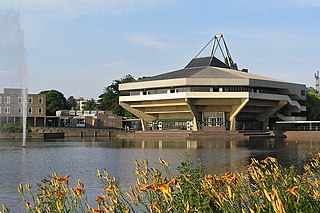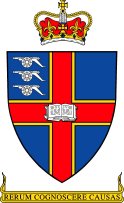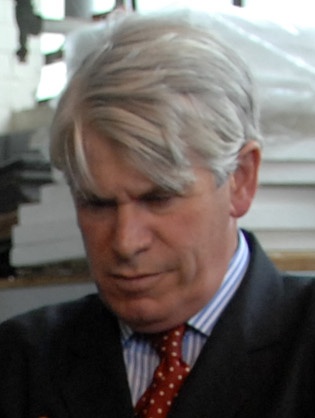Early life
He was born in Sunderland.
He attended the Loughborough College of Technology (now Loughborough University) where he studied Aeronautical Engineering, and Cranfield Institute of Technology (now Cranfield University) from 1947.

Peter Ambrose Hearne FREng (14 November 1927 - 24 January 2014) was a British engineer, who developed a lot of the technology for head-up displays (HUD). He was Chairman of GEC Avionics.
He was born in Sunderland.
He attended the Loughborough College of Technology (now Loughborough University) where he studied Aeronautical Engineering, and Cranfield Institute of Technology (now Cranfield University) from 1947.

He joined BOAC in 1949 and BEA in 1954, where he worked as an aerodynamicist.
He became deputy general manager of Marconi Avionics in 1960. He became general manager in 1966.
He married in April 1952 and had three sons; his wife was the secretary of the technical director of BOAC. He lived at Wateringbury. He enjoyed gliding. He died in 2014. [1]
The General Electric Company (GEC) was a major British industrial conglomerate involved in consumer and defence electronics, communications, and engineering. The company was founded in 1886, was Britain's largest private employer with over 250,000 employees in the 1980s, and at its peak in the 1990s, made profits of over £1 billion a year.

Loughborough University is a public research university in the market town of Loughborough, Leicestershire, England. It has been a university since 1966, but it dates back to 1909, when Loughborough Technical Institute began with a focus on skills directly applicable in the wider world. In March 2013, the university announced it had bought the former broadcast centre at the Queen Elizabeth Olympic Park as a second campus. The annual income of the institution for 2021–22 was £328 million of which £39.2 million was from research grants and contracts, with an expenditure of £379.4 million.
The Plessey Company plc was a British electronics, defence and telecommunications company. It originated in 1917, growing and diversifying into electronics. It expanded after World War II by acquisition of companies and formed overseas companies.

The AI.24Foxhunter was an airborne radar carried by the Panavia Tornado ADV fighter aircraft and gave it an all-weather, day and night, beyond-visual-range engagement capability.

Cranfield University is a British postgraduate-only public research university specialising in science, engineering, design, technology and management. Cranfield was founded as the College of Aeronautics (CoA) in 1946. Through the 1950s and 1960s, the development of aircraft research led to growth and diversification into other areas such as manufacturing and management, and in 1967, to the founding of the Cranfield School of Management. In 1969, the College of Aeronautics was renamed the Cranfield Institute of Technology, was incorporated by royal charter, gained degree awarding powers, and became a university. In 1993, it adopted its current name.

A plate glass university or plateglass university is one of a group of universities in the United Kingdom established or promoted to university status in the 1960s. The original plate glass universities were established following decisions by the University Grants Committee (UGC) in the late 1950s and early 1960s, prior to the Robbins Report in 1963. However, the term has since expanded to encompass the institutions that became universities as a result of Robbins' recommendations.

Ferranti or Ferranti International plc was a UK electrical engineering and equipment firm that operated for over a century from 1885 until it went bankrupt in 1993. The company was once a constituent of the FTSE 100 Index.
The Marconi Company was a British telecommunications and engineering company that did business under that name from 1963 to 1987. Its roots were in the Wireless Telegraph & Signal Company founded by Italian inventor Guglielmo Marconi in 1897, which underwent several changes in name after mergers and acquisitions. The company was a pioneer of wireless long distance communication and mass media broadcasting, eventually becoming one of the UK's most successful manufacturing companies. In 1999, its defence equipment manufacturing division, Marconi Electronic Systems, merged with British Aerospace (BAe) to form BAE Systems. In 2006, financial difficulties led to the collapse of the remaining company, with the bulk of the business acquired by the Swedish telecommunications company, Ericsson.
The Doctor of Engineering is a professional degree awarded in engineering and applied science. An EngD is a terminal degree similar to a PhD in engineering but applicable more in industry rather than in academia. The degree is usually aimed toward working professionals.
British Airways Engineering is the aircraft maintenance subsidiary of British Airways which provides support services to British Airways and other airlines. It is responsible for the entire BA fleet maintenance, cabin interior conversions and general ramp maintenance work for both their own fleet and other airlines. It also sends some of its own heavy maintenance work out to other companies, although the vast majority of aircraft and cabin interior work is still carried out by BA Engineering itself.

The Royal Military College of Science (RMCS) was a British postgraduate school, research institution and training provider with origins dating back to 1772. It became part of the Defence Academy of the United Kingdom in 2009, and ceased to exist as an independent unit in 2015.
Ronald McCaffer is Emeritus Professor of Construction Management at Loughborough University in Loughborough, England. He is a specialist in the management of the processes, technology, contractual and procurement systems of the construction industry.

David Warren Arthur East is a British businessman and engineer. He is a former chief executive officer (CEO) of Rolls-Royce Holdings, a leading UK-based engine manufacturer, and previously held senior positions at ARM Holdings and Texas Instruments.

Lieutenant General Andrew Collingwood Figgures CB CBE FREng is a former Master-General of the Ordnance.
Sir Andrew Charles Mayfield is a British businessman. He was Chairman of the John Lewis Partnership from 2007 to 2020, and was also Chairman of the UK Commission for Employment and Skills until its closure in March 2017. He previously served in the British Army as an officer.
Eli Jidere Bala is a Nigerian professor of Mechanical engineering and the Director-General of the Energy Commission of Nigeria.
Robert Hugh Macmillan was Professor of Mechanical Engineering at Swansea University and went on to become Director of the Motor Industry Research Association (MIRA) where he installed an early linear induction motor to investigate vehicle safety, as well as overseeing MIRA's successful transition to a commercial research organisation. He ended his career as a Professor at Cranfield University.
Sir Donald Murdo McCallum CBE FRAeS FREng FRSE FIET was a Scottish radar engineer and an important industrialist.

The École Supérieure des Technologies Industrielles Avancées (ESTIA), translated as "Institute of Advanced Industrial Technologies", is a French engineering and research graduate school. Founded in 1996, it is a general engineering school training trilingual versatile engineers, to undertake positions such as product engineer, supply chain planner/manager, quality manager, production manager, and project manager.